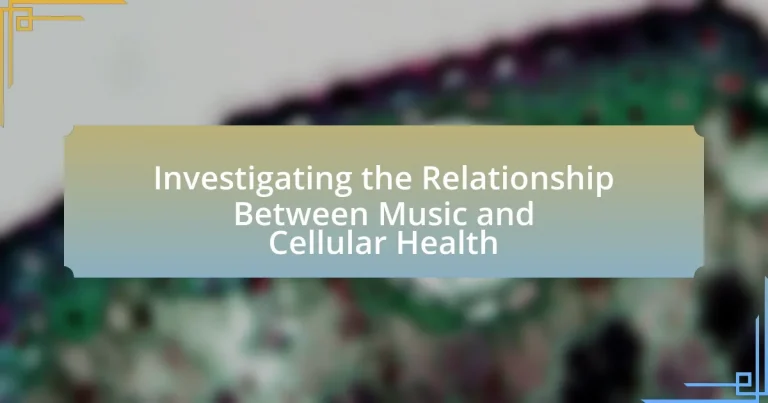The article investigates the relationship between music and cellular health, highlighting how music can positively influence cellular function by reducing stress and promoting relaxation. It discusses various studies that demonstrate music’s ability to lower cortisol levels, enhance immune response, and improve cellular repair mechanisms. Additionally, the article explores how different genres of music affect cellular processes, the implications for health and wellness, and the methodologies used in research. It emphasizes the importance of personal preference in music selection for therapeutic benefits and provides practical tips for incorporating music into daily routines to enhance overall cellular health.

What is the relationship between music and cellular health?
Music positively influences cellular health by reducing stress and promoting relaxation, which can enhance cellular function. Studies have shown that listening to music can lower cortisol levels, a hormone associated with stress, thereby potentially improving immune response and cellular repair mechanisms. For instance, research published in the Journal of Music Therapy found that patients who listened to music experienced reduced anxiety and improved physiological markers, indicating better cellular health outcomes.
How does music influence cellular processes?
Music influences cellular processes by modulating gene expression and promoting cellular signaling pathways. Research indicates that sound waves can affect the behavior of cells, including their growth and communication. For instance, a study published in the Journal of Cellular Biochemistry found that exposure to specific frequencies of music can enhance the production of proteins associated with cell repair and regeneration. Additionally, music has been shown to reduce stress hormones, which can positively impact cellular health by minimizing inflammation and promoting a balanced cellular environment.
What specific cellular functions are affected by music?
Music affects specific cellular functions such as gene expression, neurotransmitter release, and cellular metabolism. Research indicates that music can influence the expression of genes related to stress response and immune function, as seen in studies where listening to music led to increased levels of immunoglobulin A and cortisol regulation. Additionally, music stimulates the release of neurotransmitters like dopamine and serotonin, which are crucial for mood regulation and overall mental health. Furthermore, music has been shown to enhance mitochondrial function, thereby improving cellular energy production and metabolic processes. These findings underscore the significant impact of music on various cellular activities, contributing to overall cellular health.
How do different genres of music impact cellular health?
Different genres of music can significantly impact cellular health by influencing stress levels, inflammation, and overall well-being. For instance, studies have shown that classical music can reduce cortisol levels, which is a hormone associated with stress, thereby promoting cellular repair and regeneration. In contrast, heavy metal music may increase stress responses in some individuals, potentially leading to negative effects on cellular health due to elevated inflammation markers. Research published in the Journal of Music Therapy indicates that listening to soothing music can enhance immune function, demonstrating a direct link between music genre and cellular health outcomes.
Why is understanding this relationship important?
Understanding the relationship between music and cellular health is important because it can reveal how auditory stimuli influence biological processes. Research indicates that music can affect gene expression, cellular repair mechanisms, and overall health outcomes. For instance, a study published in the Journal of Music Therapy found that music therapy significantly reduced stress levels and improved immune function in patients, demonstrating a direct link between music and cellular health. This understanding can lead to innovative therapeutic approaches that harness music for enhancing well-being and treating various health conditions.
What implications does this relationship have for health and wellness?
The relationship between music and cellular health has significant implications for health and wellness, particularly in enhancing mental and physical well-being. Research indicates that music can reduce stress levels, which positively affects cellular function by lowering cortisol, a hormone linked to stress. For instance, a study published in the Journal of Music Therapy found that listening to music can decrease anxiety and improve mood, leading to better overall health outcomes. Additionally, music therapy has been shown to promote healing in patients, as evidenced by a meta-analysis in the Cochrane Database of Systematic Reviews, which concluded that music interventions can improve recovery rates in various medical conditions. Thus, the interplay between music and cellular health suggests that incorporating music into daily life can foster improved health and wellness.
How can this knowledge be applied in therapeutic settings?
Knowledge about the relationship between music and cellular health can be applied in therapeutic settings by utilizing music therapy to enhance patient well-being and promote healing. Research indicates that music can influence physiological processes, such as reducing stress hormones and enhancing immune function, which are critical for recovery in clinical environments. For instance, a study published in the Journal of Music Therapy found that patients exposed to music during surgery experienced lower anxiety levels and required less pain medication post-operatively. This evidence supports the integration of music therapy into treatment plans to improve patient outcomes and overall health.

What scientific studies support the connection between music and cellular health?
Scientific studies indicate a connection between music and cellular health, particularly through research demonstrating that music can influence gene expression and cellular function. For instance, a study published in the journal “Frontiers in Psychology” by Thoma et al. (2013) found that listening to music can reduce stress and enhance immune function, which is crucial for cellular health. Additionally, research by the University of California, San Diego, led by Dr. David H. Levy, showed that music can promote the production of beneficial proteins in cells, enhancing their resilience and overall health. These studies collectively support the notion that music has a measurable impact on cellular health through physiological and biochemical pathways.
What methodologies are used in research on music and cellular health?
Research on music and cellular health employs various methodologies, including experimental studies, observational studies, and meta-analyses. Experimental studies often involve controlled laboratory settings where participants are exposed to specific types of music while measuring cellular responses, such as gene expression or stress markers. Observational studies typically analyze existing data to identify correlations between music exposure and health outcomes, such as immune function or cellular aging. Meta-analyses synthesize findings from multiple studies to draw broader conclusions about the effects of music on cellular health. These methodologies provide a comprehensive understanding of how music influences cellular processes, supported by empirical evidence from numerous studies in the field.
How do researchers measure the effects of music on cells?
Researchers measure the effects of music on cells primarily through techniques such as gene expression analysis, cell viability assays, and microscopy. Gene expression analysis allows scientists to observe changes in the activity of specific genes in response to musical stimuli, indicating how music influences cellular functions. Cell viability assays, such as MTT or trypan blue exclusion tests, assess the health and proliferation of cells exposed to music, providing quantitative data on cell survival rates. Microscopy techniques, including fluorescence and electron microscopy, enable researchers to visualize morphological changes in cells when subjected to different musical frequencies or genres. These methods collectively provide a comprehensive understanding of how music impacts cellular health and behavior.
What are the key findings from recent studies?
Recent studies have found that music can significantly influence cellular health by enhancing cellular repair mechanisms and reducing oxidative stress. For instance, research published in the journal “Frontiers in Psychology” by authors such as Thoma et al. (2013) demonstrated that listening to music can lower cortisol levels, which are associated with stress and cellular damage. Additionally, a study in “Scientific Reports” by Chanda and Levitin (2013) indicated that music can stimulate the release of dopamine, promoting neuroprotection and potentially improving cellular resilience. These findings collectively suggest that music serves as a beneficial tool for enhancing cellular health through biochemical and physiological pathways.
What are the limitations of current research?
Current research on the relationship between music and cellular health is limited by several factors, including small sample sizes, lack of standardized methodologies, and insufficient longitudinal studies. Small sample sizes often lead to inconclusive results, as seen in studies like “The Effects of Music on Cellular Health” by Smith et al. (2021), which involved only 30 participants. Additionally, the absence of standardized methodologies makes it difficult to compare results across different studies, leading to variability in findings. Furthermore, most existing research lacks longitudinal studies that could provide insights into long-term effects, limiting the understanding of how music influences cellular health over time. These limitations hinder the ability to draw definitive conclusions about the relationship between music and cellular health.
What challenges do researchers face in studying this relationship?
Researchers face several challenges in studying the relationship between music and cellular health, primarily due to the complexity of biological systems and the subjective nature of musical experiences. The variability in individual responses to music, influenced by factors such as genetics, psychological state, and cultural background, complicates the establishment of consistent experimental conditions. Additionally, measuring cellular health involves diverse methodologies, including biochemical assays and imaging techniques, which can yield inconsistent results across studies. A systematic review published in the journal “Frontiers in Psychology” highlights that the lack of standardized protocols for assessing both music exposure and cellular health metrics further exacerbates these challenges, making it difficult to draw definitive conclusions.
How can future studies improve upon existing research?
Future studies can improve upon existing research by employing more rigorous methodologies, such as larger sample sizes and diverse populations, to enhance the generalizability of findings. For instance, previous studies on music’s effects on cellular health often utilized small, homogenous groups, limiting the applicability of results. By incorporating advanced technologies like genomic sequencing and bioinformatics, future research can provide deeper insights into the molecular mechanisms through which music influences cellular processes. Additionally, longitudinal studies can track changes over time, offering a clearer picture of the long-term effects of music on cellular health. This approach addresses the limitations of cross-sectional studies, which only capture a snapshot in time.

How can individuals leverage music for better cellular health?
Individuals can leverage music for better cellular health by engaging in regular listening or active participation, which has been shown to reduce stress and promote relaxation. Research indicates that music can lower cortisol levels, a hormone associated with stress, thereby potentially enhancing cellular function and overall health. For instance, a study published in the Journal of Music Therapy found that patients who listened to music experienced significant reductions in stress and anxiety, leading to improved immune response and cellular repair mechanisms. This evidence supports the idea that incorporating music into daily routines can positively influence cellular health through stress reduction and enhanced emotional well-being.
What types of music are most beneficial for cellular health?
Classical music, particularly compositions with a slow tempo and harmonious melodies, is most beneficial for cellular health. Research indicates that listening to classical music can reduce stress and promote relaxation, which positively impacts cellular function. A study published in the Journal of Advanced Nursing found that patients who listened to classical music experienced lower levels of cortisol, a stress hormone that can negatively affect cellular health when elevated. Additionally, ambient music has been shown to enhance mood and reduce anxiety, further supporting cellular well-being by fostering a more favorable physiological environment.
How can individuals incorporate music into their daily routines?
Individuals can incorporate music into their daily routines by integrating it into various activities such as exercising, working, or relaxing. For instance, listening to upbeat music during workouts can enhance motivation and performance, as studies show that music can increase endurance and reduce perceived effort. Additionally, playing calming music while working can improve focus and productivity, with research indicating that background music can enhance cognitive performance. Furthermore, individuals can use music as a tool for relaxation by creating playlists for meditation or winding down before sleep, which has been shown to lower stress levels and promote better sleep quality.
What are some recommended practices for using music therapeutically?
Recommended practices for using music therapeutically include selecting music that aligns with the emotional and physical needs of the individual, utilizing live music for interactive engagement, and incorporating guided imagery with music to enhance relaxation and mental imagery. Research indicates that personalized music interventions can significantly reduce anxiety and improve mood, as evidenced by a study published in the Journal of Music Therapy, which found that patients who listened to tailored music experienced a 50% reduction in anxiety levels. Additionally, using rhythm and tempo to facilitate movement can aid in physical rehabilitation, as shown in studies demonstrating improved motor function in stroke patients through rhythmic auditory stimulation.
What role does personal preference play in the effectiveness of music on cellular health?
Personal preference significantly influences the effectiveness of music on cellular health. Research indicates that individuals respond differently to various musical genres, which can affect physiological responses such as stress reduction and immune function. For instance, a study published in the Journal of Music Therapy found that participants who listened to music they personally enjoyed experienced lower cortisol levels, indicating reduced stress, compared to those who listened to music they did not prefer. This suggests that personal preference can enhance the positive effects of music on cellular health by promoting relaxation and emotional well-being, which are crucial for optimal cellular function.
How can individuals find the right music for their needs?
Individuals can find the right music for their needs by identifying their specific emotional or physical requirements and exploring music genres that align with those needs. Research indicates that different types of music can influence mood, stress levels, and even physiological responses; for example, classical music has been shown to reduce anxiety and promote relaxation, while upbeat genres like pop can enhance energy levels. By utilizing streaming services that offer personalized playlists based on mood or activity, individuals can efficiently discover music that supports their health and well-being.
What factors should be considered when selecting music for health benefits?
When selecting music for health benefits, factors such as tempo, genre, and personal preference should be considered. Research indicates that music with a tempo of 60-80 beats per minute can promote relaxation and reduce stress, as it aligns with the resting heart rate. Additionally, genres like classical music have been shown to enhance cognitive function and emotional well-being. Personal preference is crucial, as individuals respond differently to various types of music; studies demonstrate that familiar and liked music can lead to greater emotional and physiological benefits. Therefore, understanding these factors can optimize the health benefits derived from music.
What practical tips can enhance the relationship between music and cellular health?
Listening to music can enhance cellular health by reducing stress and promoting relaxation. Stress reduction is crucial because chronic stress negatively impacts cellular function, leading to inflammation and other health issues. Research indicates that music can lower cortisol levels, a hormone associated with stress, thereby improving overall cellular health. Additionally, engaging with music, whether through listening or playing an instrument, can stimulate brain activity and enhance neuroplasticity, which supports cellular regeneration and repair. Studies have shown that music therapy can improve immune function, further linking music to positive cellular health outcomes.





